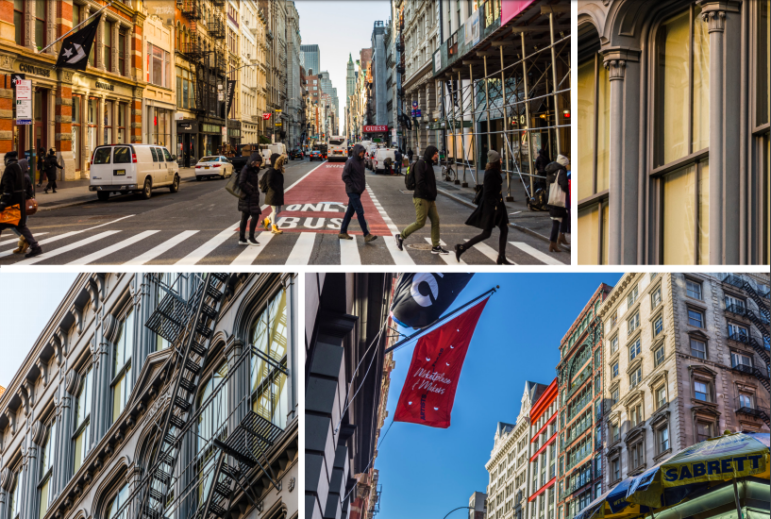‘We need fewer barriers to access and more affordable housing. With just over a year left in this administration, rezoning SoHo is an important legacy that shouldn’t be pushed off any longer.’

NYCDCP/SoHo Broadway Initiative/NoHo-Bowery Stakeholders
SoHo scenes captured for a report issued last November mapping a possible rezoning of the Manhattan neighborhood.Hard as it is to believe for a young person or newcomer struggling to make it in New York City, SoHo was once an affordable neighborhood. Decades ago, it became a haven for low-income residents who created a thriving community among its spacious yet dirt-cheap lofts.
Today the neighborhood is unrecognizable. SoHo is no longer a hotbed of artistic expression but one of the most expensive districts in the country, the home of high fashion and luxury.
The people who catalyzed this transformation moved in because they needed low-rent spaces to work and live. New York is increasingly a city without any such options for residents who can’t afford astronomically high living costs. That’s why the communities looking for their own SoHo-like haven today pop up in the outer boroughs.
Especially in these times New Yorkers like to think of ourselves as an island of progressivism in a country that is increasingly narrow-minded. But we don’t have to look to the suburbs or to faraway states to find that exclusion and tribalism is alive and well right here. SoHo is twice as wealthy, and twice as white, as New York City. Limiting growth in this neighborhood limits access to opportunity and creates market pressures that ripple throughout the city.
 CityViews are readers’ opinions, not those of City Limits. Add your voice today!
CityViews are readers’ opinions, not those of City Limits. Add your voice today!
Current zoning excludes all but a tiny segment of New Yorkers from centrally located, transit rich SoHo that would be an ideal location for more affordable housing. This is not hyperbole. To live in SoHo one must receive legal approval from the Department of Cultural Affairs confirming that one is indeed a legitimate artist, which has resulted in it being effectively protected for white, wealthy New Yorkers.
We must see the irony in barring from SoHo the same people that created the legendary neighborhood we know today: the low-income, marginalized New Yorkers looking for a break in one of the world’s toughest real estate markets. Because that is exactly what the community’s long standing, exclusionary zoning is doing.
SoHo is a perfect case study for the increasing body of evidence that limiting housing production spurs gentrification. Rezoning SoHo would not fundamentally change its character, but it could provide several hundred low-income families the safety net of an affordable unit in a safe neighborhood with rich access to jobs and other amenities. Limiting the affordable housing to only artists is a slap in the face to all the essential workers who have kept this city running throughout the pandemic.
Two years ago, Councilmember Chin and Borough President Brewer started a rezoning process with the Department of City Planning that would open SoHo up to affordable housing and create a more equitable district in the heart of Manhattan.
Now is the time to see the SoHo rezoning through—and we have only a few weeks left to do it.
The city needs to start the environmental scoping for a more equitable SoHo zoning by mid September, if they are going to be able to get this done under the present administration.
Even before the state passed the strictest anti-eviction laws ever last year, the erroneous claim that rezoning would lead to a spike in evictions, especially for seniors, is just fear-mongering to preserve outdated privileges. In reality those living in SoHo have some of the highest incomes in the city and are not at risk of losing their housing regardless of residency protections.
The reality is that we are refusing to open access to SoHo for fear of displacing vocal millionaires when there are large groups of working class New Yorkers who still have to work to make rent and are commuting from the furthest reaches of the city into Manhattan every day just to keep their home.
Housing is a universal right, and we must break down the 50-plus-year-old rules that don’t have a place in our city anymore. At the height of a pandemic that is exacerbating an already devastating housing shortage, we need to redouble our commitment to equity. We need fewer barriers to access and more affordable housing. With just over a year left in this administration, rezoning SoHo is an important legacy that shouldn’t be pushed off any longer.
Jessica Katz is the executive director of Citizens Housing & Planning Council.









3 thoughts on “Opinion: The Window is Closing to Rezone for a More Equitable SoHo”
Why does CityLimits publish such claptrap?
Doesn’t Ms. Katz know that the mayor proclaimed on the Brian Lehrer show in January – BEFORE the covid shutdown – that there is simply not enough time left to rezone SoHo/NoHo and that instead he will concentrate on areas where there is no opposition from seasoned grassroots community activists, as is the case in SoHo/NoHo.
(And nothing has come of that, either)
Further, Ms. Katz should be ashamed of herself for selling out and pushing the agenda of that astroturf group, Open NY, whose founder is a real-estate scion and which counts realtors among its leadership.
The group is pushing for a real-estate-driven rezoning of our community, something not a SINGLE person spoke in favor of at dozen of meetings last year, not even the landlords of SoHo/NoHo.
“Twice as white”
The real “racist”
Is Ms Katz
The demographics of 10013, where all the housing would go under this plan, are the same as Manhattan. 54% white. And the median income is below the rest of Manhattan. Stop writing obvious falsehoods of fact and maybe people can have an honest conversation.